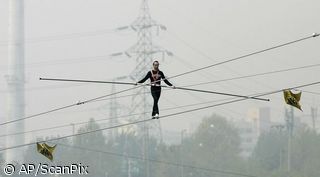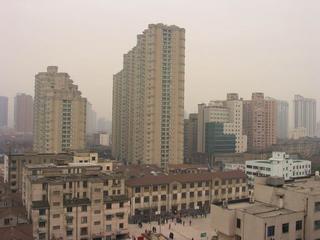Flashmobs are the latest craze in Europe this summer
Published:
18 August 2003 y., Monday
Flashmobs are the latest craze in Europe this summer. It’s another scorching day in Berlin, and on the Alexanderplatz in the city’s center, people are sitting on the edge of a fountain, hoping to catch some relief from the heat. A few are standing around in curious expectation. An Internet site had said a flashmob would take place at 5:00 p.m. But at 4:59 there was no trace of anything out of the ordinary.
Then at five on the dot, a circle of some 10 people suddenly convened around the fountain from out of nowhere. They were all young men in their 20s. Each took off his left show and passed it to his neighbor. Within about 15 seconds, the shoes had made a full circle and were back with their owners. The men gave themselves a high-five and dispersed without a trace. All that was left after their departure were amused and slightly confused onlookers, wondering what they just say.
Flashmobs, or spontaneous gatherings of people engaged in somewhat pointless activities, are the most recent U.S. import. In June of this year, the first such event took place in a Macy’s department store in New York. Since then, the concept has spread quickly across the United States, and leapfrogged over to Australia, Singapore and, as of the end of July, made its way to Europe.
In Germany, flashmobs have become very popular among a mostly young, computer-savvy group. More than 150 towns and cities have been the sites for the blitz-like gatherings, and in Berlin, at least two or three of the brief nonsensical events are announced every day on various Web sites, e-mail lists and mobile phone messages.
Šaltinis:
dw-world.de
Copying, publishing, announcing any information from the News.lt portal without written permission of News.lt editorial office is prohibited.
The most popular articles
 Moon bears pierced with metal tubes to extract an ingredient used in medicine have been saved from captivity in China.
more »
Moon bears pierced with metal tubes to extract an ingredient used in medicine have been saved from captivity in China.
more »
 Georgian acrobat Ramaz Garshaulishvili is trying to revive interest in the circus by demonstrating his rope walking skills.
more »
Georgian acrobat Ramaz Garshaulishvili is trying to revive interest in the circus by demonstrating his rope walking skills.
more »
 The latest trend for New Yorkers who are low on storage space - storing clothes in the oven and kitchen cupboards.
more »
The latest trend for New Yorkers who are low on storage space - storing clothes in the oven and kitchen cupboards.
more »
 Around the world 10 million people live in refugee camps - more than the population of several small European Union countries combined.
more »
Around the world 10 million people live in refugee camps - more than the population of several small European Union countries combined.
more »
 On World Press Freedom Day on 3 May the Commission will officially launch the Lorenzo Natali Prize for 2010.
more »
On World Press Freedom Day on 3 May the Commission will officially launch the Lorenzo Natali Prize for 2010.
more »
 What was once some of Albania's most beautiful coastline has been turned into toxic dumping grounds. Deborah Lutterbeck reports.
more »
What was once some of Albania's most beautiful coastline has been turned into toxic dumping grounds. Deborah Lutterbeck reports.
more »
 A set of two-square-metre capsule apartments in Beijing give struggling individuals a chance to have their own space.
more »
A set of two-square-metre capsule apartments in Beijing give struggling individuals a chance to have their own space.
more »
 The World Bank is adding its weight to efforts to save the world's endangered tigers.
more »
The World Bank is adding its weight to efforts to save the world's endangered tigers.
more »
 The statue of the Little Mermaid that has sat atop Copenhagen's harbour for nearly a hundred years is unveiled at the Shanghai World Expo.
more »
The statue of the Little Mermaid that has sat atop Copenhagen's harbour for nearly a hundred years is unveiled at the Shanghai World Expo.
more »
 Beijing city officials have come up with a novel way to combat the stench of the city's growing rubbish tips.
more »
Beijing city officials have come up with a novel way to combat the stench of the city's growing rubbish tips.
more »